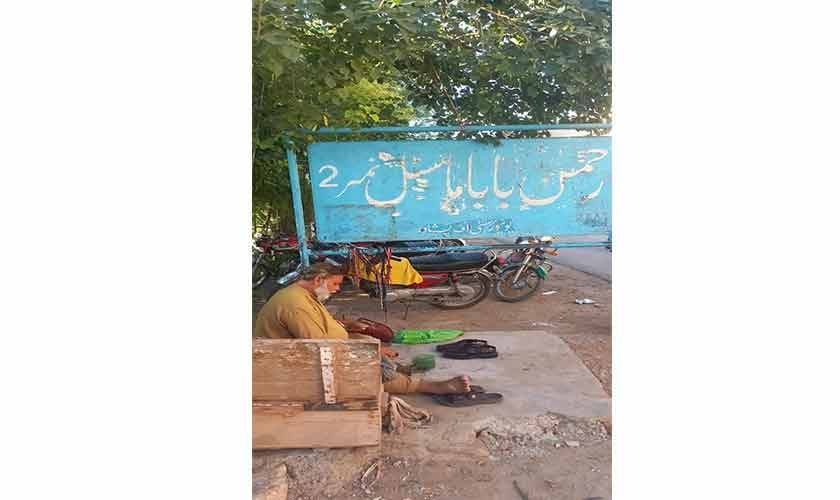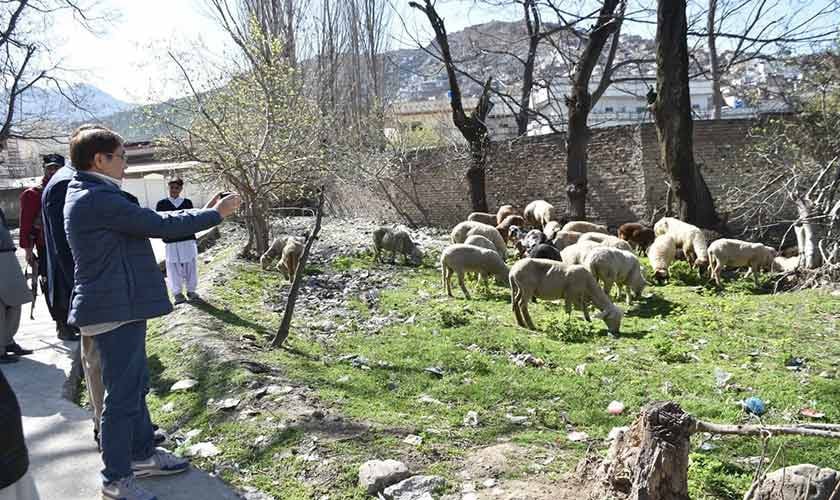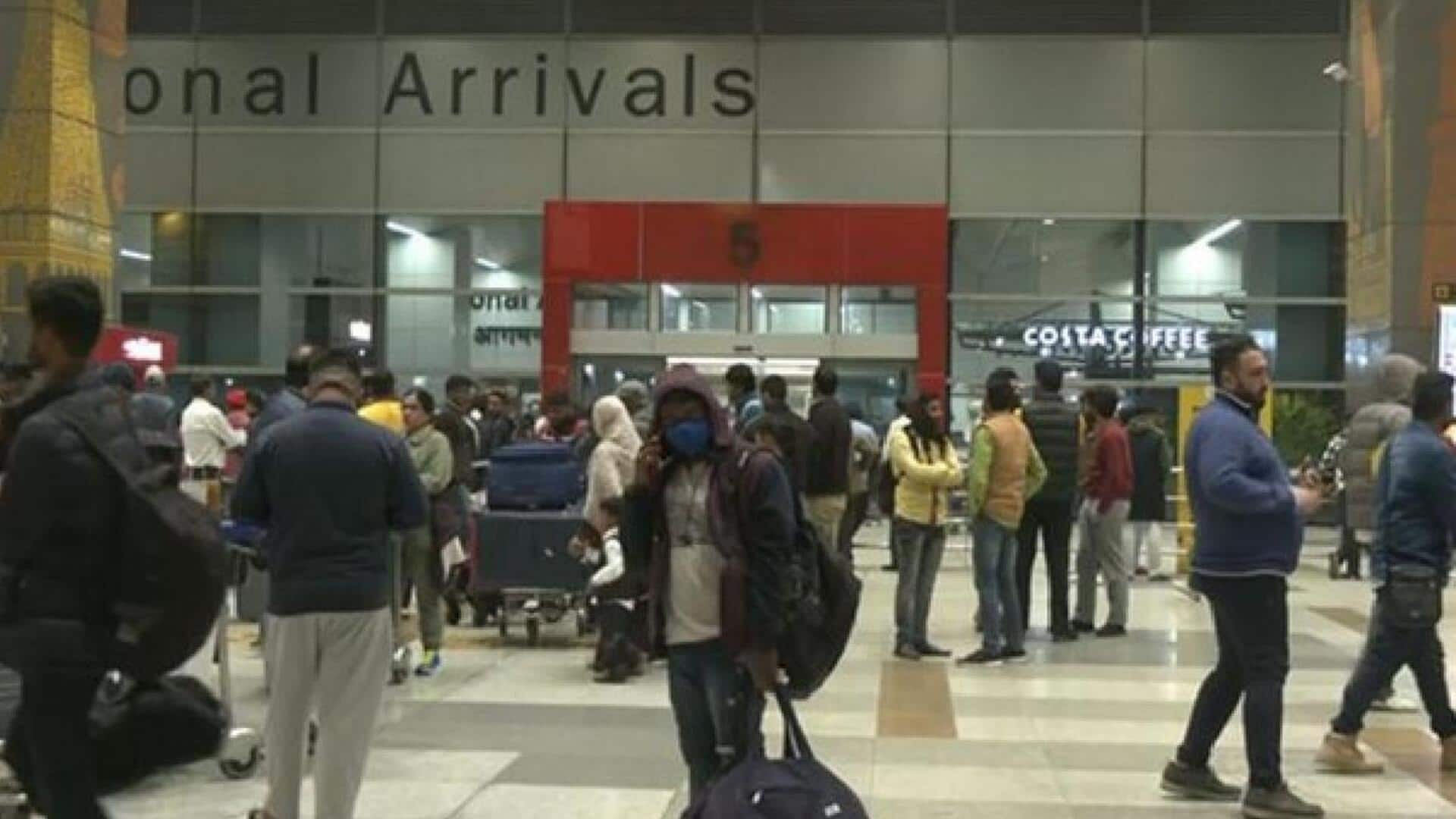It is 10 am on a Saturday, and Muhammad Seyaar, the shoe-shine man, has hardly received any customers. On weekends, the campus of the University of Peshawar is unusually still. The usual buzz of students rushing between lectures, tea stalls steaming with hot tea and parathas, and hostel corridors alive with laughter has quieted down.
At the gate of Rahman Baba Hostel, also known as Hostel-2, sits Muhammad Seyaar, the polish wala. His back rests against a battered wooden box of polish and brushes, his knees drawn close, his eyes fixed on the empty street. There are no customers today. There rarely are on weekends as students and professors retreat into leisure; for Seyaar, leisure means hunger.
Seyaar has occupied this spot for more than thirty years, watching generations of students pass by, their shoes scuffed from the dust of Peshawar’s streets. Many of them went on to become bureaucrats, judges, entrepreneurs, and politicians. Few asked his name, fewer still ask about his story. Why would they? As Seyaar puts it, “They needed me for their shoes, not for my stories.”
The student hostels of Peshawar University are worlds unto themselves, with crowded dorms, tea stalls overflowing with gossip, loud bursts of conversation over cricket matches in the TV lounge, late-night study sessions, and occasionally, guitar and tappa mehfils punctuated by political protests.
Among all this, shoes are everywhere: sneakers kicked off at the entrance, sandals left outside prayer rooms, polished black and brown Oxfords required for official functions. And then there are the lovers’ amulets that need leather covers for the dual purpose of safety and decoration.
For students, the hostel years are a watershed moment where they transition from adolescence to adulthood, and from dependence to independence. Students carry their ambitions on their shoulders and their anxieties in their restless feet. Seyaar sits at the gate, watching these young lives in motion, like a sentry to their dreams.
He has little time to think of his own children, some of whom carry mental disabilities. “Social stratification is a reality,” says Anab Khan, a former resident of Hostel-2. “We remember our rooms, but not the person who polished our shoes every day; they’re really invisible right in front of our eyes,” he admits.
In thirty years, Seyaar has polished thousands of shoes. He says he remembers the shoes more than the faces; the heavy boots of soldiers, the fine leather of professors, the dusty sandals of broke students. “Shoes tell you more than faces,” he muses. “They carry the identity of their wearer.”
Seyaar is nearly sixty now. His hair has whitened, his face is lined, his eyesight clouded like the faded signboard of the hostel behind him. He came to Peshawar as a young man from Swabi with big dreams and strong ambitions.
He found shelter through a kind human being, a professor at Islamia College, Peshawar, who offered Seyaar’s family a place to reside in the servants’ quarters at the professor’s residence. His wife and children performed household chores, while Seyaar earned a living by shining shoes.
“The professor was like a saint,” Seyaar recalls, his voice trembling. “When we were sick, he took us to the hospital. He even donated blood for us once. He would introduce us to the doctors; we were his family, not his servants.” Such benevolence is rare. Perhaps that is why Seyaar remembers it so vividly.
But kindness has its limits. When the professor retired, Seyaar had to move on, finding new employers and new accommodations. Like a household possession, he was handed down to another professor, then another, then another.
Seyaar never dreamt of having his own roof, but his late wife did. “She had a dream to have a two-room home of her own,” Seyaar recalls with tears in his eyes. His shoe-shine business never quite rose him beyond survival.
The COVID-19 lockdowns hit especially hard. Campuses were closed down, streets became empty, shoes gathered dust in closets instead of polish from his brush. While he was trying to cope with it, tragedy struck. His wife fell ill.
Seyaar sold off the few assets his wife had accumulated to buy a house of her own. He sold the cow, some jewelry, and miscellaneous household goods to pay for her treatment. For fifteen days, Seyaar stood beside her bed in the hospital; on the sixteenth, she was gone.
He pauses when he tells this part of the story. For a man who has polished thousands of shoes, words come harder than labour. “She was my strength,” he whispers.
The irony is painful. While giving shine to others, his own life remains dull.
https://www.thenews.com.pk/tns/detail/1346837-muhammad-seyaar-polish-wala



